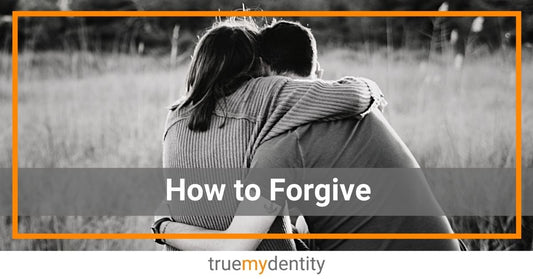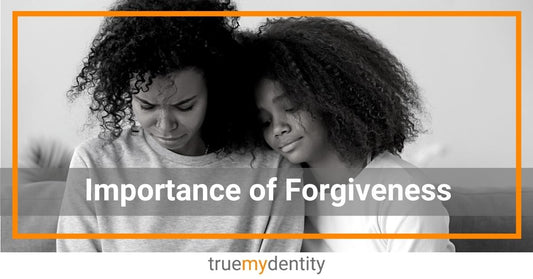Understanding how to forgive yourself is an important lesson to learn for your emotional and physical health, and overall well-being. Forgiving oneself can be one of the hardest things to do. It is easy to hold on to past mistakes and constantly berate oneself for them. However, carrying the burden of past mistakes can cause stress, anxiety, and even depression. By being honest with yourself, practicing self-compassion, focusing on the present moment and future outlook of things; you can work on letting go of resentment and regret, and move toward forgiving yourself for past mistakes. In this post we outline the general process of how to forgive yourself and why it is important.
Importance of Forgiving Yourself for Past Mistakes
Learning how to forgive yourself is critical for one's emotional and mental health, and it is an essential component of a healthy life. When we forgive others, we release the resentment and anger that we carry within ourselves, and we can move forward with a sense of peace. However, forgiving yourself for past mistakes or regrets can be even more challenging than forgiving others. It is essential to understand that forgiving yourself is not the same as excusing yourself from accountability. Instead, it helps to acknowledge mistakes, take responsibility for your actions, and learn from your experiences.
Carrying guilt and shame for past mistakes can lead to negative self-talk, anxiety, and depression; even physical symptoms like fatigue and headaches. It can also affect your relationships with others, leading to a lack of trust and a feeling of unworthiness. Forgiving yourself is about releasing these negative emotions, increasing your self-esteem and self-worth, and moving forward with self-love and self-compassion; which can have a positive impact on your relationships and overall quality of life.
Furthermore, forgiving ourselves can help us to develop more compassion and empathy for others. When we are able to extend forgiveness to ourselves, we may be more inclined to offer forgiveness to others as well. This can create a more harmonious and compassionate world, both for ourselves and those around us.
5 Challenges You May Face in Forgiving Yourself
Forgiving yourself for past mistakes can be a difficult and challenging process. We believe it is best to be aware of, and prepared for, the potential hurdles one might face when doing the work to forgive yourself. Some of the common challenges that a person may face while trying to forgive themselves are:
1) Guilt and Shame
Guilt and shame are powerful emotions that can be so intense they can make it difficult for you to move on and can have a severe impact on your mental and emotional well-being.
Guilt and shame are often closely linked, but they are different emotions. Guilt is a feeling of remorse or regret for something that you have done, while shame is the feeling of embarrassment or disgrace for who you are. When you experience guilt or shame, it can be hard to distinguish between the two.
One of the most challenging aspects of this process is accepting responsibility for your actions. It's natural to want to avoid facing the consequences of your mistakes, but doing so only prolongs your feelings of guilt and shame. Acknowledging why you're upset with yourself or why you have regrets, even if it makes you uncomfortable, is part of the process of forgiving yourself for past mistakes and letting go of the pain, hurt, guilt and shame.
Another challenge is learning to separate your actions from your self-worth. Just because you made a mistake doesn't mean you are a bad person. You must be able to recognize that one or several of the infinite actions you will take in your lifetime do not define you as a person, that you are entirely capable of making amends and changing your behavior.
Brene Brown has dedicated her career to researching vulnerability and shame, and this video, Listening to Shame, offers wonderful insight. It may shed some light on how to forgive yourself.
2) Fear of Judgment or Rejection
One of the primary challenges that comes from the fear of being judged is the tendency to ruminate past mistakes. You may replay past events in your mind and worry about how others may perceive you. This can lead to a cycle of negative thoughts and emotions.
Another challenge is the belief that others will view you negatively if they know about your mistakes. This fear of judgment can be so intense that you may avoid seeking support or opening up to others. This isolation can make it hard to move past mistakes and forgive ourselves.
The fear of rejection can also be a significant barrier to self-forgiveness. You may worry that if you admit your mistakes, others will no longer want to associate with you or be in a relationship with you. This fear can be particularly challenging in close relationships where individuals feel vulnerable and exposed.
To overcome these challenges, you must recognize your fear of judgment and rejection is often based on your own assumptions rather than reality. It's essential to challenge these negative thoughts and remind yourself that everyone makes mistakes. Seeking support from trusted friends, family, or trained and licensed professional therapists can help you through the process.
3) Difficulty Accepting Responsibility
Accepting responsibility means acknowledging that the actions taken were your own, they were wrong, and they may have caused harm to oneself or others. This acceptance also involves acknowledging that you had control over your actions and the ability to make different choices. This can be a tough realization to face, as it can bring up feelings of guilt, shame, and remorse.
Accepting responsibility requires you to confront your mistakes and the impact they had on others. This can be a painful and uncomfortable process, as it involves facing the discomfort, hurt or pain that was caused to others. It also requires a willingness to make amends and take steps towards repairing any damage that was done.
It also may require a person to assess their own limitations. Nobody will ever achieve perfection, but you may pressure yourself to try. It can be difficult to acknowledge and accept that mistakes will inevitably be made, but it is essential to learning how to forgive yourself, and enabling your own personal growth. Learning from mistakes is a powerful teaching tool.
4) Difficulty Letting Go of the Past
One of the main reasons why letting go of the past can be challenging is that past mistakes can be deeply ingrained in a person's identity and personal perceptions of themselves. When a person makes a mistake, it can lead to feelings of shame, guilt, and self-doubt, and these emotions can become a part of how you define yourself if not addressed empathetically and compassionately. This can make it challenging to let go of the experience and the emotions tied to it.
Another challenge of letting go of the past is the fear of repeating the same mistakes. When a person has made a significant mistake in the past, it can create a fear of failure or a lack of confidence in one's ability to make better choices in the future. This fear can lead to a reluctance to take risks or try new things, which can hinder personal growth and development.
Also, letting go of the past may be challenging because of the social or cultural expectations that come with forgiveness. There may be pressure to forgive oneself quickly or to move on from the past without fully processing the emotions associated with it. This pressure can make it difficult to fully confront and work through the negative emotions associated with past mistakes.
5) Difficulty Trusting Oneself
Past mistakes can lead to a loss of confidence in your own judgment and decision-making abilities. You may doubt your ability to make good decisions and worry about making similar mistakes in the future. Whether it is your own self-assessment and personal shaming, or if it is brought on by criticism from others, this loss of confidence can lead to a lack of trust in yourself and a reluctance to take risks or make important decisions in your life.
It's important to remember that learning how to forgive yourself is a process that takes time and patience. By acknowledging these challenges and seeking support from others, a person can work through these obstacles and move towards self-forgiveness.
How to Forgive Yourself - General 6 Step Process
Learning how to forgive yourself can be a challenging process. We have just covered some of the challenges you may face while working through it. The actual process of forgiving yourself is unique to each individual, and you will need to discover and practice what works best for you. That said, here are some general steps that may provide some guidance for your own journey through the process of how to forgive yourself:
1) Acknowledge Your Role
The first step in forgiving yourself is to acknowledge your role in the wrongdoing that you are struggling with. Accepting the circumstances and your role in the experience, and acknowledging the impact they had on yourself and others is essential to this process.
2) Process Your Emotions
This one can be hard to do alone. Allow yourself to feel and process your emotions surrounding the circumstances and your role in the experience. This may involve talking to a trusted friend or therapist, journaling, or engaging in other self-care activities to help you cope with the difficult emotions. Truly be patient with yourself and the process. Accept that your feelings are valid and natural, and it's okay to give yourself time to work through them.
3) Decide to Forgive Yourself
Forgiving yourself is a choice, and it is important to make a conscious decision to forgive yourself for your role in the experience. Recognize that you deserve to move forward and let go of the negative emotions associated with the experience. This decision may take time and effort, but it's worth it in the end.
4) Practice Self-Compassion
Self-compassion involves treating yourself with kindness and understanding. Instead of beating yourself up over any wrongdoing or unfortunate circumstances, try to show yourself the same compassion and forgiveness that you would offer a friend or loved one. This means acknowledging that you are human and capable of making choices that can hurt yourself or others. But, that you deserve forgiveness and healing for these missteps and the opportunity to learn from these experiences to grow in understanding.
5) Take Action to Make Amends
Depending on the circumstances involved in the experience, it may be helpful to take action to make amends and repair any damage caused. This could involve apologizing to those affected, making restitution, or taking steps to prevent similar wrongdoings in the future. Taking action can help you feel empowered and in control, and can also demonstrate your commitment to learning from your mistakes and moving forward.
6) Let Go of Guilt and Shame
Forgiving yourself involves letting go of the guilt and shame associated with your role in the experience. This can be difficult and may take time, but it's important to remember that holding onto these negative emotions only harms yourself in the long run. Practice self-compassion and remind yourself that you are worthy of forgiveness and growth. Focus on learning from the experience and using it as an opportunity for personal development, rather than dwelling on it and letting it define you.
Noteworthy: Seek Professional Help
If you are struggling with self-forgiveness, seeking the help of a mental health professional can be beneficial. A therapist can help you work through your feelings and develop strategies for self-forgiveness.
It's important to remember that forgiving oneself is a process that takes time and patience. It's also important to seek support from others, such as a trusted friend, therapist, or support group, if needed. Taking initiative to find help when you need it is not weak or small. Sometimes it takes great strength and courage to admit you need help, and to willingly seek it out. But it is likely to help you work through difficult situations, past experiences and your emotions tied to them.
Forgive Yourself Quotes
- "Forgive yourself for not knowing what you didn't know before you learned it." - Maya Angelou
- "Forgive yourself first. Release the need to replay a negative situation over and over again in your mind. Don't become a hostage to your past by always reviewing and reliving your mistakes. Don't remind yourself of what should have, could have or would have been. Release it and let it go." - Iyanla Vanzant
- "Forgiving yourself is as important as forgiving others. Guilt is toxic, re-living the mistake over and over. Love yourself. Forgive yourself." - Robert Tew
- "Forgiving yourself does not erase the past, but it does enlarge the future." - Paul Boese
- "To forgive oneself is the beginning of a lifelong romance." - Oscar Wilde
- "Forgive yourself and welcome love back into your life." - Wayne Dyer
- "Forgive yourself for not being perfect, for not knowing everything, for not having it all figured out. It's okay to make mistakes and learn as you go." - Unknown
- "Forgiveness is giving up the hope that the past could have been any different." - Oprah Winfrey
- "Forgiveness is not an occasional act, it is a constant attitude." - Martin Luther King Jr.
- "Forgive yourself for the things you've done wrong, but don't forget the lessons you've learned." - Dalai Lama
Forgiving - True Mydentity Style
True Mydentity offers designs on our clothes that highlight 58 positive character traits. The powerful forgiving trait is one of the 58 character traits featured. We believe if you know your dominant positive characteristics; focus on what you do to learn, work and build relationships using these dominant traits; you will feel more fulfilled and closer to your purpose. And as you improve upon leveraging these positive character traits in those three areas of your life; you move toward discovering your full potential.
If being forgiving is an important part of who you are, make True Mydentity’s forgiving apparel part of your character’s power suit; and be the forgiving character you’re meant to be.
VIEW FORGIVING APPAREL COLLECTION >>
Complete True Mydentity’s FREE questionnaire and find out which of the 58 traits are your most dominant.




